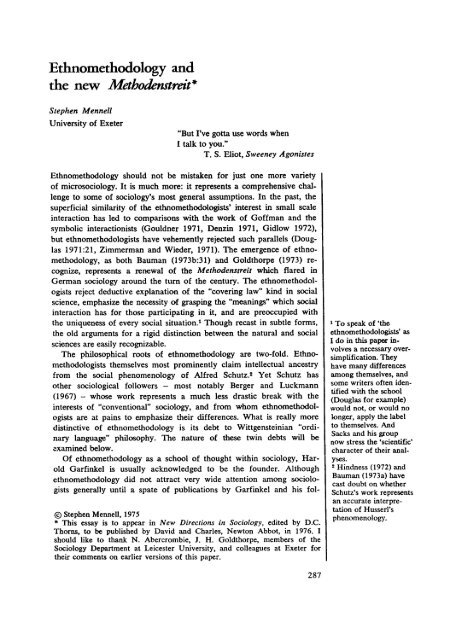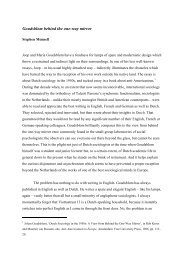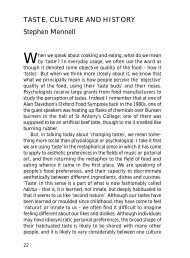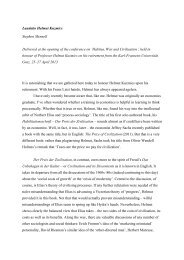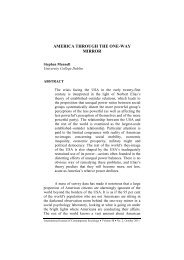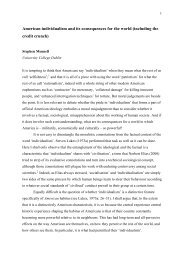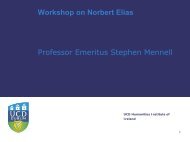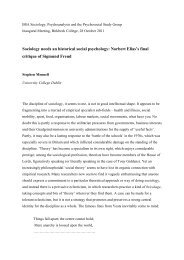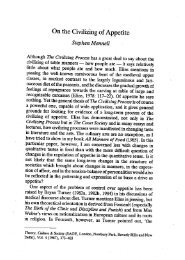Ethnomethodology and the New "Methodenstreit" - Stephen Mennell
Ethnomethodology and the New "Methodenstreit" - Stephen Mennell
Ethnomethodology and the New "Methodenstreit" - Stephen Mennell
Create successful ePaper yourself
Turn your PDF publications into a flip-book with our unique Google optimized e-Paper software.
<strong>Ethnomethodology</strong> <strong>and</strong><strong>the</strong> new Methodemiret<strong>Stephen</strong> <strong>Mennell</strong>University of Exeter"But I've gotta use words whenI talk to you."T. S. Eliot, Sweeney Agonistes<strong>Ethnomethodology</strong> should not be mistaken for just one more varietyof microsociology. It is much more: it represents a comprehensive challengeto some of sociology's most general assumptions. In <strong>the</strong> past, <strong>the</strong>superficial similarity of <strong>the</strong> ethnomethodologists' interest in small scaleinteraction has led to comparisons with <strong>the</strong> work of Goffman <strong>and</strong> <strong>the</strong>symbolic interactionists (Gouldner 1971, Denzin 1971, Gidlow 1972),but ethnomethodologists have vehemently rejected such parallels (Douglas1971:21, Zimmerman <strong>and</strong> Wieder, 1971). The emergence of ethnomethodology,as both Bauman (1973b:31) <strong>and</strong> Goldthorpe (1973) recognize,represents a renewal of <strong>the</strong> Methodenstreit which flared inGerman sociology around <strong>the</strong> turn of <strong>the</strong> century. The ethnomethodologistsreject deductive explanation of <strong>the</strong> "covering law" kind in socialscience, emphasize <strong>the</strong> necessity of grasping <strong>the</strong> "meanings" which socialinteraction has for those participating in it, <strong>and</strong> are preoccupied with<strong>the</strong> uniqueness of every social situation.' Though recast in subtle forms,<strong>the</strong> old arguments for a rigid distinction between <strong>the</strong> natural <strong>and</strong> socialsciences are easily recognizable.The philosophical roots of ethnomethodology are two-fold. Ethnomethodologists<strong>the</strong>mselves most prominently claim intellectual ancestryfrom <strong>the</strong> social phenomenology of Alfred Schutz.2 Yet Schutz haso<strong>the</strong>r sociological followers - most notably Berger <strong>and</strong> Luckmann(1967) - whose work represents a much less drastic break with <strong>the</strong>interests of "conventional" sociology, <strong>and</strong> from whom ethnomethodologistsare at pains to emphasize <strong>the</strong>ir differences. What is really moredistinctive of ethnomethodology is its debt to Wittgensteinian "ordinarylanguage" philosophy. The nature of <strong>the</strong>se twin debts will beexamined below.Of ethnomethodology as a school of thought within sociology, HaroldGarfinkel is usually acknowledged to be <strong>the</strong> founder. Althoughethnomethodology did not attract very wide attention among sociologistsgenerally until a spate of publications by Garfinkel <strong>and</strong> his fol-i) <strong>Stephen</strong> <strong>Mennell</strong>, 1975* This essay is to appear in <strong>New</strong> Directions in Sociology, edited by D.C.Thorns, to be published by David <strong>and</strong> Charles, <strong>New</strong>ton Abbot, in 1976. 1should like to thank N. Abercrombie, J. H. Goldthorpe, members of <strong>the</strong>Sociology Department at Leicester University, <strong>and</strong> colleagues at Exeter for<strong>the</strong>ir comments on earlier versions of this paper.1 To speak of '<strong>the</strong>ethnomethodologists' asI do in this paper involvesa necessary oversimplification.Theyhave many differencesamong <strong>the</strong>mselves, <strong>and</strong>some writers often identifiedwith <strong>the</strong> school(Douglas for example)would not, or would nolonger, apply <strong>the</strong> labelto <strong>the</strong>mselves. AndSacks <strong>and</strong> his groupnow stress <strong>the</strong> 'scientific'character of <strong>the</strong>ir analyses.2 Hindness (1972) <strong>and</strong>Bauman (1973a) havecast doubt on whe<strong>the</strong>rSchutz's work representsan accurate interpretationof Husserl'sphenomenology.287


